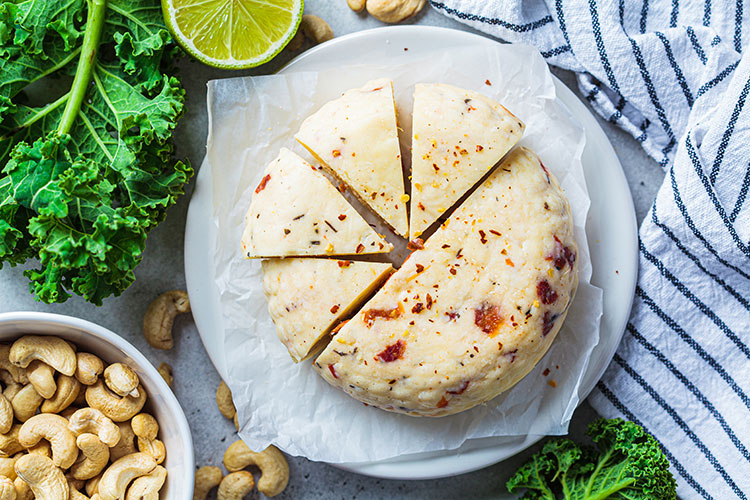Cheese alternatives are the next frontier in the dairy-free world. Today, there are several types of products which present their own set of challenges such as instability and texture. Citri-Fi® citrus fiber’s water holding and emulsification properties bind the oil and water to create high quality cheese analogs that simulate their animal-based counterparts.
Through the years, cheese producers convinced the market that cheese is the magic ingredient that makes food taste great! Commercials encouraged parents to melt it on vegetables to make it more palatable for their children. Pizza is not pizza unless there is a long stretch of mozzarella hanging off the slice. And when snacking hit its peak, cheese stood on a pedestal due to its protein content and dairy health benefits. Because of this, dairy-based cheese literally milked the market. The popularity created an opportunity for new offerings such as cheese alternatives.
At the same time, the dairy alternative demand began to tick up. Growing concerns about sustainability, animal welfare and health consequences of animal-based fats spurred a sudden interest in creating cheese without animal milk. As a result, today, there are a variety of cheese analogs using different types of food ingredients and processing technologies. And there is no better time to discuss this topic rather than now in January aka Veganuary.
Starch and Fat-based Cheese Alternatives
Many companies try to mimic common cheese types including sliced cheeses for sandwiches and vegan burgers, soft cheese like camembert, or even products that match fresh or cream cheese. To do this, producers have different options. For instance, a lower cost route incorporates a fat source and modified starches. Spreadable types use liquid fats. On the other hand, hard cheeses require solid fats like palm or coconut in combination with starches. However, palm and coconut are questionable when it comes to sustainability. As a result, some shy away and resort to using sunflower or canola oil.
One challenge using these types of fats and modified starches is creating a stable emulsion without chemical emulsifiers. Because clean labeling is another important requirement, manufacturers look for alternative ingredients. Another underlying issue is that these type of cheeses have no nutritional value. Their bases are made up of starch and contain minimal protein versus animal-based cheeses.
Citri-Fi citrus fiber can help bind the oil and water in these type of formulations. The high surface area and native intact pectin content enables emulsification properties. As a result, cheese texture and stability are not compromised. Also, Citri-Fi contributes some dietary fiber, so this helps improve the nutritional content.
Fermented Nut Cheeses
Another type of cheese that is popular is fermented nut cheeses. These cheeses typically use almond or cashew as a base. The nutritional profile is better due to the nut protein content. And the flavor profile simulates the natural flavor of cheese which can come close to aged cheese. However, this process comes with more costs and tends to be pricier. And when nuts are ground, they tend to not bind all the fat inside which causes separation.
Because Citri-Fi is a great natural emulsifier, it can bind oil and water to help reduce the costs and improve the yields of these products. Water migration is common in products that do not have a good emulsifying system. As a result, Citri-Fi helps prevent weeping during refrigeration. In the end, Citri-Fi, at low usage levels (0.1% to 0.6%), provides emulsification, stability and nutritional benefits to a variety of cheese alternatives. This can range from cream cheese substitutes, parmesan alternatives to other vegan cheese analogs.
This cheese alternative market is the new frontier in the dairy-free world. In the future, cheese will use different protein sources like chickpeas and fava beans. Producers will push the envelope using fermentation, new processes and new ingredients to create high quality cheeses matching their animal-based counterparts.
Citri-Fi is non-GMO Project certified, non-allergenic and gluten-free. This natural ingredient has no E-number. Labeling options include citrus fiber, dried citrus pulp or citrus flour which resonate well in the natural and clean label markets.
Please contact us for more information.


